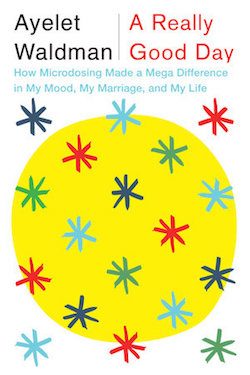
Ayelet Waldman was desperate. Her feelings of anger and despair were so overwhelming during perimenopause that they continuously caused her to act out. It was destroying her relationships—including her marriage.
As an acclaimed writer known for her personal essays on mental health and parenting—and author of Bad Mother, among other books—Waldman "tried every prescription drug imaginable" and nothing had worked to get her emotional life back on track.
She was dealing with suicidal thoughts when she began to research the use of tiny doses of LSD to treat depression. And with nothing to lose, she decided to try it—and that's when the sun came out and everything changed.
"Normally when you stop feeling depressed, the change is gradual—you almost don't notice it because you feel a little better each day. But with this, the change was immediate," the author says. "One day, I was desperate enough to commit a crime and take an illegal drug. And the next day I felt good."
Waldman candidly describes her month of microdosing LSD—taking doses so small that some claim they don't elicit any adverse side effects—in her new book, A Really Good Day. Here, she shares how it impacted her life.
Keep reading to find out what microdosing LSD is really like.

LSD: The mindfulness hack?
"Generally, my problem is that I get stressed out and fly off the handle," Waldman explains. "I overreact to things, which triggers a shame response, which then leads to depression. But the depression is why I fly off the handle. It's a vicious cycle." Her month on LSD completely broke that cycle.

{{post.sponsorText}}
"Typically after something happens, there's a four-step process," Waldman says. "You have an emotional response, which leads to a thought, which leads to an impulse, which leads to an action. But usually those four steps happen so quickly you don't even realize they are separate steps. The LSD slowed down the process."
"Microdosing LSD was a shortcut to mindfulness for me"
She explains that she would have an emotion, but then she would stop and think about what that emotion really was. Anger? Fear? Something else? And that led to her thinking before she acted—AKA way fewer angry tweets or searing comments she would regret later. "Microdosing LSD was a shortcut to mindfulness for me," she says.
The other most noticeable way Waldman says microdosing affected her was that it made her way more productive. "That's why all these tech bros are doing it," she says. "It's like being on Adderall, without the irritability."

But it's not all sunshine and rainbows
For someone experiencing the same immobilizing depression Waldman did, microdosing LSD may seem like the holy grail. But while it did improve Waldman's life, she says that in the end, the drug isn't really about happiness.
"Going through this experience made me realize it's more about being content and appreciating your life"
"I've been sort of obsessed with the idea of, if something could make myself happier, everything would be fine," she says. "But going through this experience made me realize it's more about being content and appreciating your life—which often gets confused with happiness, but isn't the same thing." Case in point? Parenting, which Waldman says is rarely fun, but always joyful.
"I don't want a drug that will just make me happy," she says. "I don't want to be happy about Donald Trump being elected president. I want to maintain that outrage without living in a permanent state of fear."

Here's why she quit it
Microdosing LSD changed Waldman's life for the better, so it's a little surprising that she doesn't recommend other people try it—and after her month on the drug was up, she herself stopped using.
"I was desperate enough to commit a crime, but I don't recommend it," she explains. "It's illegal and it's really dangerous to commit a crime—especially in this political climate."
That said, she admits that people are going to microdose anyway. Sound like you? Here's her suggestion: "It's not safe to buy drugs on the illegal market because you don't know what exactly you're taking, so it's important to test them with a drug testing kit." It was a safeguard she herself did during her month of (barely) dropping acid.
"We’re blocking off a really reasonable source of medication because of this lunatic prohibition"
Which doesn't mean that Waldman's okay with the laws surrounding certain psychedelic drugs; after all, she's seen firsthand how beneficial they can be. "We’re blocking off a really reasonable source of medication because of this lunatic prohibition," she says.
It's been a while since Waldman's magical month of microdosing, and she says that she's doing okay—thanks in large part to moving past the perimenopause state she was in—but it's taking a lot of work.
"I started going to dialectical behavioral therapy, which is mix between cognitive behavioral therapy and mindfulness," she says. "It's hard as hell and taking a tremendous amount of time, effort, and focus." But until scientists and lawmakers start looking at psychedelic drugs with a more open mind, that's what she'll continue to do.
Speaking of drugs, here's one unexpected way people are getting high: cacao. Plus, did you know that mindfulness meditation can be used as a painkiller?
Loading More Posts...